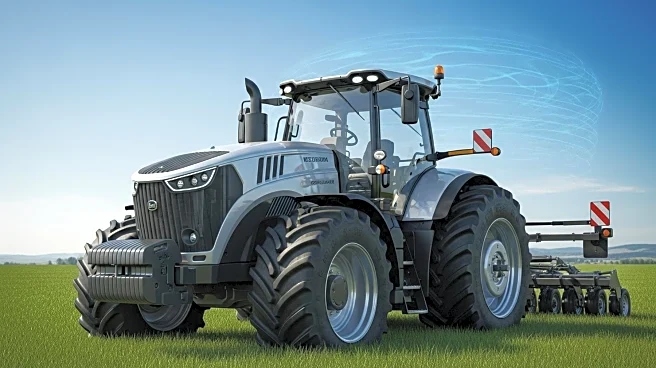What is the story about?
What's Happening?
The U.S. agricultural machinery market is set for rapid growth, driven by technological advancements and increasing demand for efficient farming solutions. The market, valued at USD 140 billion in 2020, is projected to reach USD 205 billion by 2028, growing at a CAGR of 7%. Key players such as AGCO Corp, Kubota Corp, and Yanmar Co. Ltd. are investing in precision agriculture technologies, including GPS-enabled tractors and autonomous machinery. These innovations aim to enhance productivity, optimize resource use, and support sustainable farming practices.
Why It's Important?
The growth of the agricultural machinery market is significant for the U.S. economy and food production industry. Technological advancements in machinery improve farming efficiency, reduce labor costs, and increase crop yields, addressing the growing demand for food and biofuels. Precision agriculture technologies also contribute to environmental sustainability by minimizing resource wastage and reducing the ecological footprint of farming activities. As the industry evolves, it supports the U.S. agricultural sector's competitiveness in the global market, ensuring food security and economic stability.
What's Next?
The agricultural machinery market is expected to continue its expansion, with manufacturers focusing on developing more advanced and sustainable solutions. The adoption of electric tractors and AI-powered machinery is likely to increase, supported by government grants and subsidies. As precision agriculture becomes more prevalent, farmers may invest in data analytics and IoT integration to further optimize their operations. Additionally, collaborations between technology providers and agricultural companies could lead to innovative solutions tailored to specific farming needs.
Beyond the Headlines
The shift towards advanced agricultural machinery raises questions about the impact on traditional farming practices and rural communities. While technology enhances efficiency, it may also lead to reduced demand for manual labor, affecting employment in rural areas. Farmers may need to adapt to new technologies, requiring training and support to effectively utilize these innovations. Long-term, the integration of smart machinery could lead to a more resilient agricultural sector, capable of adapting to climate change and fluctuating market demands.


















